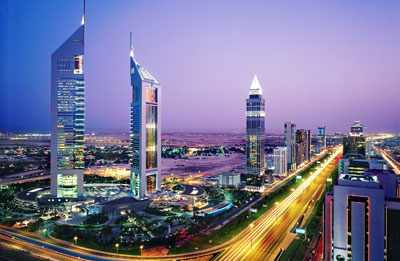
Dubai among world's 20 most dynamic cities
Dubai, January 22, 2014
Dubai has made it to the list of 20 most dynamic cities in the world that demonstrate the combination of strong short term socio-economic and commercial real estate momentum and longer term foundations for success, said a report.
San Francisco and London topped the City Momentum Index (CMI) list compiled by leading property expert Jones Lang LaSalle (JLL) ranking first and second followed by Dubai in the third spot.
The top 20 dynamic cities list includes Shanghai, Wuhan, New York, Austin,. Hong Kong, San Jose, Singapore, Shenzhen, Jakarta, Beijing, Chengdu, Los Angeles, Tianjin, Boston, Seattle, Tokyo and Lima.
In its new, proprietary City Momentum Index (CMI), the property expert goes beyond traditional, static economic rankings to delve into the underlying drivers that are the hallmark of highly dynamic cities.
JLL recognizes the fact that commercial real estate is no longer just a consequence of a city's success but a driver of it, said a senior official.
"City momentum is about far more than just raw GDP growth. The true foundation of highly dynamic cities emerges from such factors as speed of innovation and creation of cutting-edge businesses along with new building construction, property price movement and investment in real estate from cross-border investors and corporations," remarked Jeremy Kelly, the director of Global Research.
"The new city momentum index offers a fresh and uniquely comprehensive perspective that identifies the signals of change and characteristics of city momentum," stated Kelly.
By focusing on the features of a city that are likely to underpin future performance, the CMI stands apart from the standard historic performance upon which most indices are based.
It is such measures of dynamism in infrastructure, connectivity and innovation that we believe will be steering many investment and location decisions in the future, though investors and corporates should note that high momentum can pose both risk and opportunity."
As per the JLL list, the elite cities that wield clear economic might on the global stage, accounting for one-quarter of the world's direct commercial real estate investment activity from 2012-2013 are San Francisco (1), London (2), Dubai (3), New York (6), Hong Kong (8), Singapore (10), Los Angeles (15) and Tokyo (19).
The technology-rich cities that took early advantage of technology trends and provide fertile environments for innovation are: San Francisco (1), Austin (7), San Jose (9), Boston (17) and Seattle (18).
The growth hotspots beyond the BRICs driven by urban consumerism are Jakarta (12) and Lima (20).
According to CMI, the rapidly urbanizing cities in China that continue to grow with massive city-building programs despite a slowing economy are: Shanghai (4), Wuhan (5), Shenzhen (11), Beijing (13), Chengdu (14) and Tianjin (16).
The resurgent cities gearing up for events in 2020 with renewed vigor are Tokyo (19) for 2020 Summer Olympics and Dubai (3) for Expo 2020, the survey stated.
While Continental European cities are under-represented at the very top of the list and show lower momentum in comparison with emerging cities, several powerful and successful European cities possess the attributes for longer term success as validated by the ongoing high levels of real estate capital inflows.
Demonstrating success factors relating to education, innovation, sustainability and transparency, Paris, Berlin and Amsterdam, for example, are distinguished by their strengths in talent and new technologies, while Copenhagen has among the world's strongest 'green' credentials.
The City Momentum Index assesses 111 cities world-wide with a weighted overall score based on 34 short-term and longer term variables.
Short-term socio-economic momentum variables (40 per cent of the model) include recent and projected changes in GDP and population, air passenger traffic, corporate headquarter presence and recent levels of foreign direct investment as a proportion of a city's economy.
Short-term commercial real estate momentum variables (30 per cent of the model) include recent and projected percentage changes in office net absorption, office construction, office rents, shopping mall construction and retail rents, direct commercial real estate investment volumes and real estate transparency.
Longer term variables (30 per cent of the model) that are likely to determine future economic strength and real estate momentum include high-value incubator indicators such as university presence and educational infrastructure, innovation capability and presence of technology and venture capital firms.
"While most indices provide only a static picture of city competitiveness, by taking a unique look at the combination of short-term variables and sustainable long-term characteristics the CMI provides a look into underlying city dynamics, adaptability and real estate market characteristics," stated Kelly.-TradeArabia News Service







